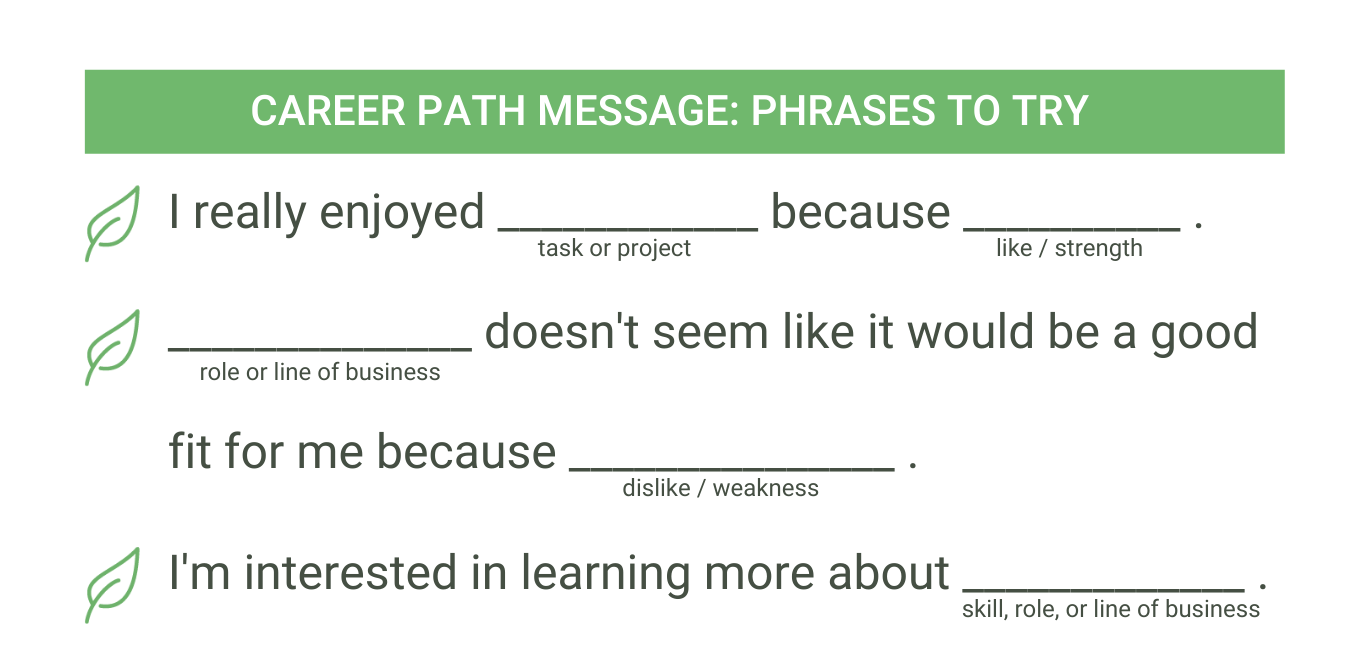Why You Need a Personal Career Path Message
Once you hit corporate mid-level and above, there is are two truths about career paths that are important to understand. First, career steps are not predictable, straight up climbs. A mentor of mine used to always say "It's not a ladder, it's a jungle gym". Second, by the time the open role is on a job posting board, it’s too late. Any manager worth their salt is constantly scouting talent, not thinking about it only when they have an open role on their team. This means that even if you’re not ready for a new role today, you need to be thinking, talking, and taking actions that will bring you opportunities when you are ready.
Several years ago I was working in a role that I enjoyed but had outgrown. There was a natural next step for me to take but I hadn’t given it much thought and when my manager would ask me if I was interested in becoming a co-brand account executive my answer was “I’m not sure.” Six months later an account executive role opened up and the hiring manager encouraged me to consider it. After reading the details and talking with some colleagues I realized it was a great next step based on my skills and interests. After I accepted the job offer the hiring manager said “I would have gotten you over here sooner, but you kept saying you weren’t sure if you wanted to be an account executive.” Wow. What a lesson. The hiring manager had approached my boss about trying to get me on his team and her questions were coming from him. Since I had expressed a neutral reaction to the idea, it never went anywhere. The lack of career path messaging from me about what I wanted next held me back. Avoid this career pitfall in two easy steps.
Step 1: Develop a clear understanding of your career interests.
Before you can create a career path message, you have to understand your skills and interests. Your message shouldn’t be “I want XYZ job”. It’s great to have a specific job title that you aspire to, but this mindset limits your prospects. Returning to this idea that career paths are like climbing a jungle gym, there could be more than one rung to reach for as your next career step. The exact path is not always evident and limiting your sights to a specific job title means you’ll be overlooked for other opportunities. For your personal career path message focus on the type of work, not the title. Grab a piece of paper and use some self-reflection to make notes on these things: strengths, weaknesses, likes, and dislikes.
Observe the interplay between your lists and use the bullets below to identify your career path guideposts. With these guideposts you’ll be better prepared to tell people what you are generally looking for and you’ll know a great next role when you see it.
You need one more list to round out your career path message, your list of deal breakers. What's a deal breaker? It's a non-negotiable. Things like work location, schedule flexibility, and salary often fall into this category. Knowing the things that you aren't willing to compromise on is an important way to avoid wasting time on opportunities that are not a fit.
Step 2: Talk about your personal career interests
The first person you should tell, and tell often, about your career aspirations is your immediate manager. Managers hear about open roles first and they can’t advocate for you in the rooms you’re not in until they know what you want. Many companies have planned career development meetings as part of defined human resource routines. Those are not enough. Think about your career path message as an advertising campaign. A consistent and clear message that is repeated often is a mandate for any successful advertising campaign. Weave this messaging into your regular interactions. One of the easiest things you can do is to send signals of your interests and dislikes as you discuss your work.
The amazing thing about sharing your career interests with your boss is that sometimes there is opportunity to job craft. Job crafting is when a role is modified to fit your unique talents and interests. If you tell your boss “I really like eating cookies”, and there is a new work project that involves eating cookies, who will your boss think of first? Getting to design your role is a real thing, particularly in larger companies where reorganization and change is constant.
Who else should you be sharing your career interests with? Let me answer in the form of a question… has it been a hot minute since you've networked with your network? This is one of the first things to get de-prioritized as our work days get busy. I get it. But your boss isn’t the only one that’s aware of new opportunities. Get out there and connect with the people you know in your company. This should be part of what you’re doing all the time. When you do meet with people, tell them what your interests are even if you’re not currently thinking about a new role. This way when they hear of something that could be a good fit, your name will come to that person’s mind and you’ll be one of the first to know.
Conclusion
The messages you send to the people around you about your career interests will increase the number of opportunities you will hear about and be considered for. When you have clarity about your career interests and you share your career path message often you will have more options to reach for in the jungle gym of your career.


